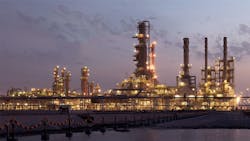Bapco lets contract for Sitra refinery modernization, expansion program
Update: Bahrain Petroleum Co. (Bapco) let a contract to Advanced Refining Technologies LLC to deliver services for a grassroots residue hydrocracking unit to be built as part of the operator’s BMP now under way at its 267,000-b/d refinery at Sitra (OGJ Online, Sept. 13, 2021).
Bahrain Petroleum Co. (Bapco) has let a long-term contract to Advanced Refining Technologies LLC (ART)—a joint venture of WR Grace & Co. and Chevron Corp.—to deliver a series of services for a grassroots residue hydrocracking unit (1RHCU) to be built as part of the operator’s long-planned Bapco Modernization Program (BMP) now under way at its 267,000-b/d refinery at Sitra on Bahrain’s eastern coast (OGJ Online, Sept. 16, 2014).
Alongside supply of its proprietary Resid Hydrocracking catalyst to enable the new 1RHCU’s maximum upgrading of a variety of bottom-of-the-barrel (BOTB) process residues into lighter, higher-value products, ART’s scope of work under the 5-year contract also includes delivery of full-cycle catalyst management (FCM) services for reclamation of metals from the unit’s spent catalyst, Bapco and ART said.
ART valued the catalyst supply and FCM contract—which includes a 5-year renewal option—at $240 million.
To be equipped with LC-FINING technology licensed by the Chevron-Lummus Technology LLC JV Chevron Lummus Global (CLG) and a processing capacity of 65,000 b/d, the new two-train 1RHCU will convert vacuum residue it receives from an existing No. 6 vacuum distillation unit (VDU) and the BMP’s proposed No. 7 VDU (7VDU) into intermediate products that will be further processed into high-margin kerosine and diesel at the new No. 2 vacuum gas oil hydrocracking unit (2HCU) under construction as part of the BMP, according to Bapco and official BMP project documents.
Also to be outfitted with process technology licensed by CLG, the new single-train 2HCU will have a processing capacity of 58,000 b/d.
The new 1RHCU—which, together with the new 2HCU, will become the main contributors to the refinery’s increased profitability following the BMP’s completion—is scheduled to reach full operations in 2023, Bapco and ART said.
BMP overview
Alongside increasing crude processing capacity at the site to 38,000 b/d and expanding the refinery’s capabilities for BOTB processing, the BMP also is designed to improve the complex’s overall energy efficiency and output of cleaner products that meet more stringent environmental standards.
Once fully completed, the BMP will reduce the Sitra refinery’s emissions of sulfur dioxide by 50%, nitrogen oxide by 5%, and treated wastewater discharged to the sea by 9%, according to the operator’s website.
In addition to upgrades of existing units at the site, the BMP involves construction of 21 new operating units as well as decommissioning of the refinery’s outdated units, including its FCC, three crude distillation units, and two VDUs, among others.
Technip Energies NV, Samsung Engineering Co. Ltd., and Tecnicas Reunidas SA are delivering engineering, procurement, construction, and commissioning (EPCC) for the project (OGJ Online, Dec. 4, 2017).
About the Author
Robert Brelsford
Downstream Editor
Robert Brelsford joined Oil & Gas Journal in October 2013 as downstream technology editor after 8 years as a crude oil price and news reporter on spot crude transactions at the US Gulf Coast, West Coast, Canadian, and Latin American markets. He holds a BA (2000) in English from Rice University and an MS (2003) in education and social policy from Northwestern University.

